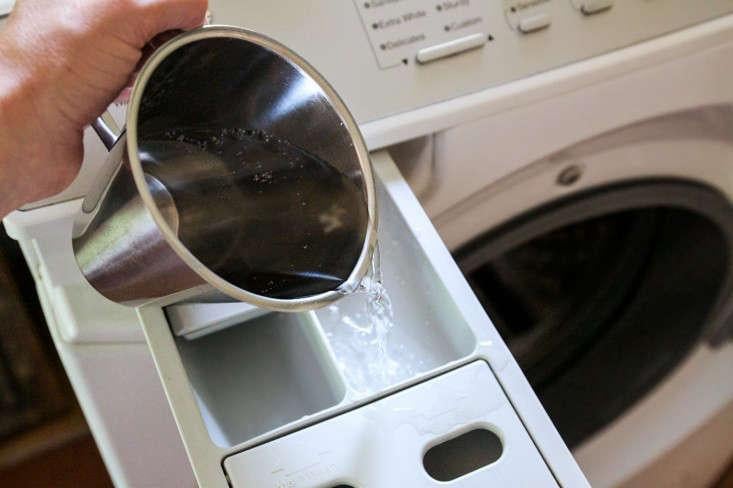How to Clean Your Washing Machine
Dirt, mould, and other grimy residue can build up inside your washer over time. Learn how to clean a washing machine, including front-loading and top-loading machines, to get your laundry as clean as possible.
Your washing machine’s main job is to clean your clothes, but did you know you should clean your washing machine at least once a month? With just a few supplies you can easily clean your washing machine to keep it looking and smelling like new.
The dirt that disappears from your clothes, towels, and sheets has to go somewhere, which means grime can build up inside your washing machine over time. Without regular cleaning, the appliance might also harbour leftover detergent, hard-water deposits, and mould or mildew around the lid. This can leave a residue on laundry or cause items to emerge from the wash with a funky smell. To ensure your freshly washed clothes and linens are as clean as possible, follow these steps on how to clean a washing machine once a month. These instructions work for cleaning front-loading and top-loading washing machines, but there are a few special considerations for both types.
If your washing machine has a self-clean function, choose that cycle and follow the manufacturer's instructions to clean the inside of the machine. Otherwise, you can use this simple, three-step process to eliminate build-up in washing machine hoses and pipes and ensure your clothes stay fresh and clean.
Step 1: Run a Hot Cycle with Vinegar
Run an empty, regular cycle on hot, using two cups of white vinegar instead of detergent. Add the vinegar to the detergent dispenser. (Don't worry about harming your machine, as white vinegar will not damage clothes.) The hot water-vinegar combo removes and prevents bacteria growth. Vinegar can also act as a deodorizer and cut through mildew odours.
Step 2: Scrub the Inside and Outside of the Washing Machine
In a bucket or nearby sink, mix about 1/4 cup vinegar with a quart of warm water. Use this mixture, plus a sponge and dedicated toothbrush, to clean the inside of the machine. Pay special attention to dispensers for fabric softener or soap, the inside of the door, and around the door opening. If your soap dispenser is removable, soak it in the vinegar water before scrubbing. Give the machine's exterior a wipe down, too.
Step 3: Run a Second Hot Cycle
Run one more empty, regular cycle on hot, without detergent or vinegar. If desired, add 1/2 cup baking soda to the drum to help clear away build-up loosened from the first cycle. After the cycle is complete, wipe out the inside of the drum with a microfiber cloth to remove any remaining residue.
Keep reading: www.curtainclean.co.nz...

⚠️ DOGS DIE IN HOT CARS. If you love them, don't leave them. ⚠️
It's a message we share time and time again, and this year, we're calling on you to help us spread that message further.
Did you know that calls to SPCA about dogs left inside hot cars made up a whopping 11% of all welfare calls last summer? This is a completely preventable issue, and one which is causing hundreds of dogs (often loved pets) to suffer.
Here are some quick facts to share with the dog owners in your life:
👉 The temperature inside a car can heat to over 50°C in less than 15 minutes.
👉 Parking in the shade and cracking windows does little to help on a warm day. Dogs rely on panting to keep cool, which they can't do in a hot car.
👉 This puts dogs at a high risk of heatstroke - a serious condition for dogs, with a mortality rate between 39%-50%.
👉 It is an offence under the Animal Welfare Act to leave a dog in a hot vehicle if they are showing signs of heat stress. You can be fined, and prosecuted.
SPCA has created downloadable resources to help you spread the message even further. Posters, a flyer, and a social media tile can be downloaded from our website here: www.spca.nz...
We encourage you to use these - and ask your local businesses to display the posters if they can. Flyers can be kept in your car and handed out as needed.
This is a community problem, and one we cannot solve alone. Help us to prevent more tragedies this summer by sharing this post.
On behalf of the animals - thank you ❤️

Worst Xmas ever?
There's a a lot of planning that goes into Christmas day and sometimes things just don't go to plan. But it can be a good thing - a family mishap or hilarious memory that you can laugh about in Christmases to come.
Whether you burnt the dinner or were stranded at an airport...
Share your Christmas mishaps below!








 Loading…
Loading…






















